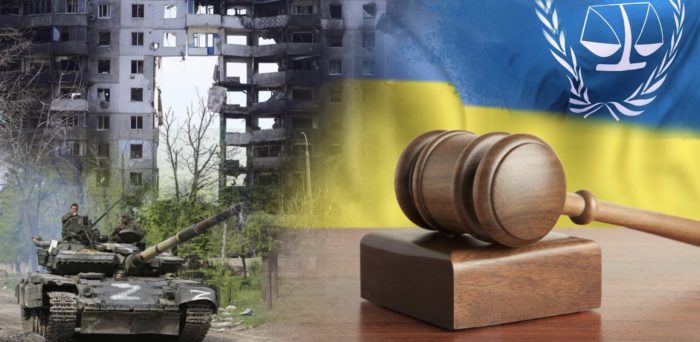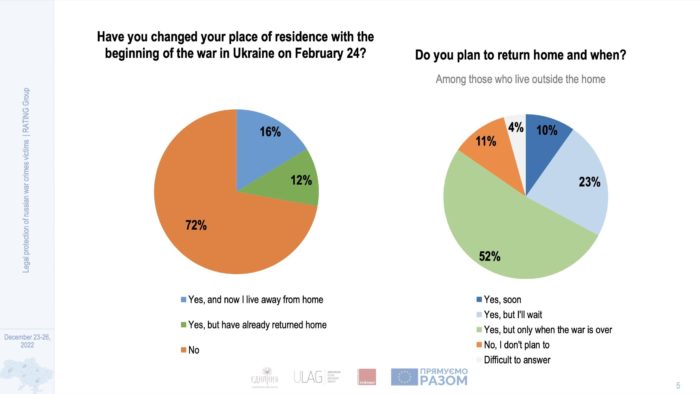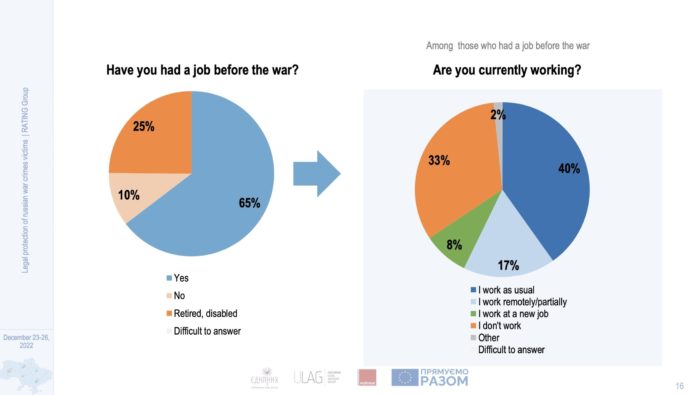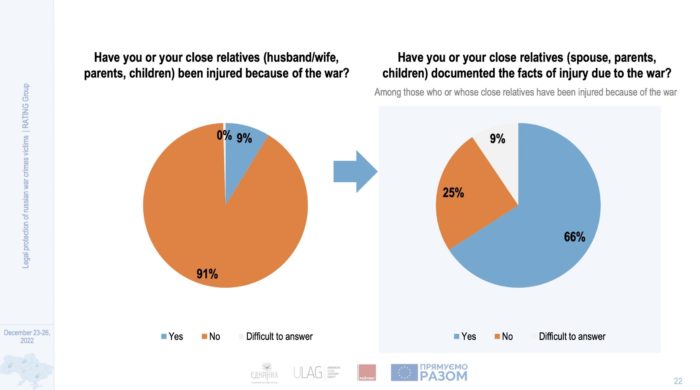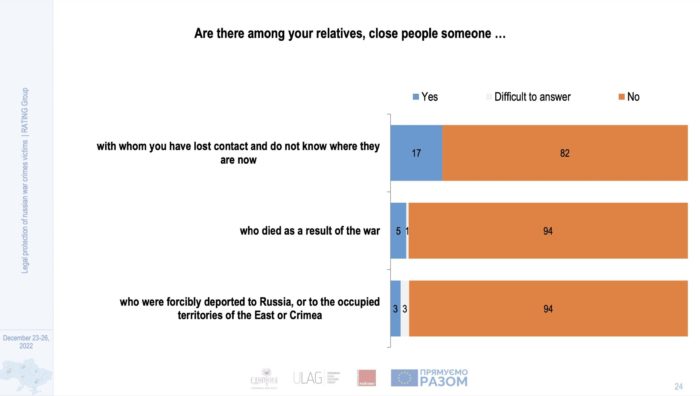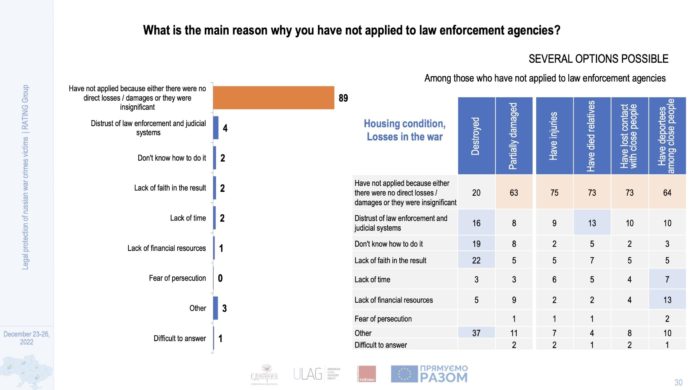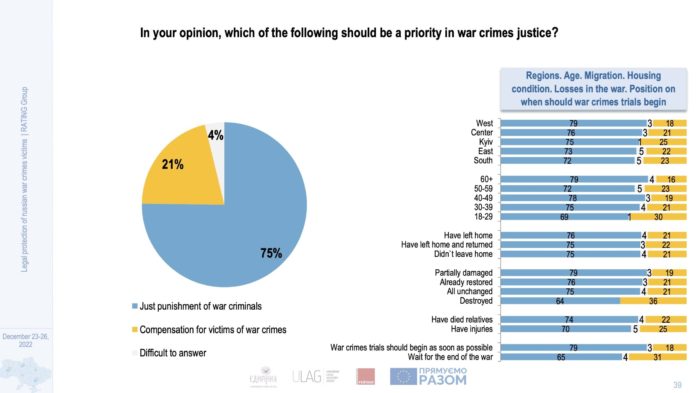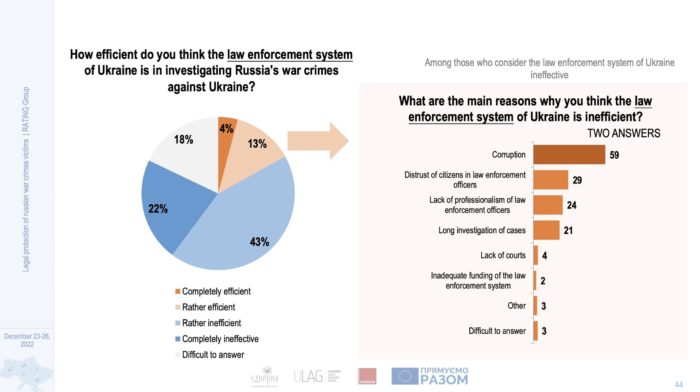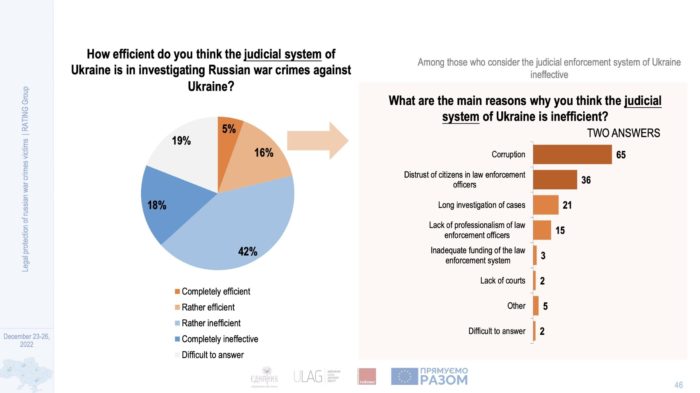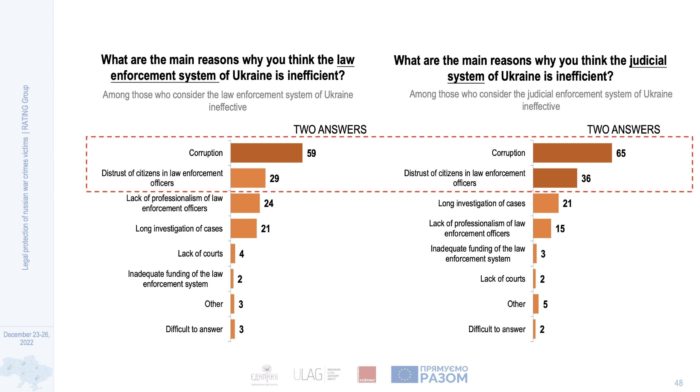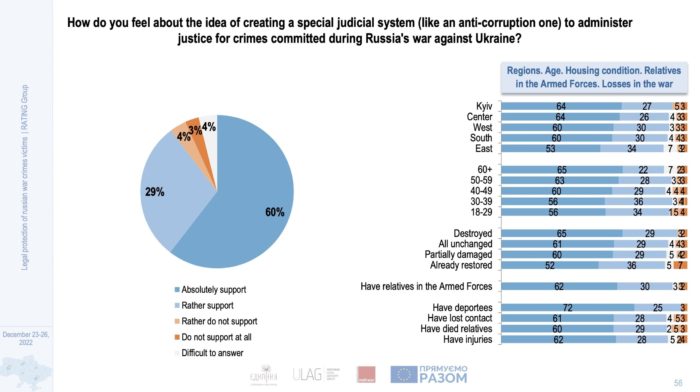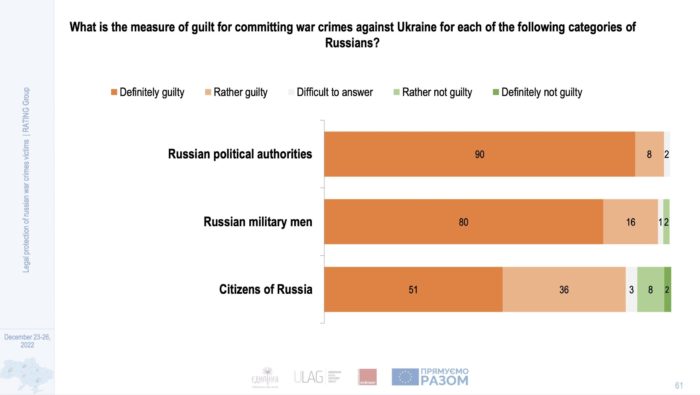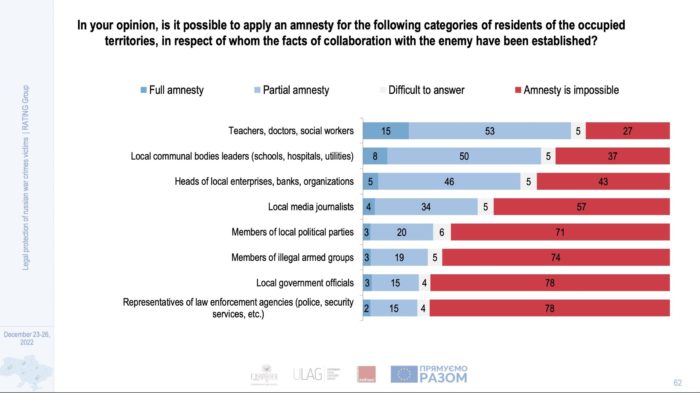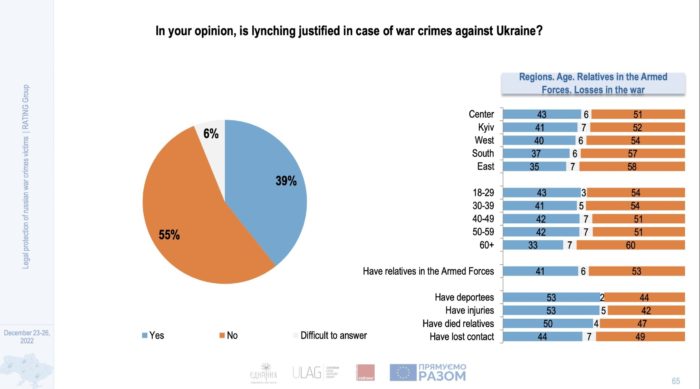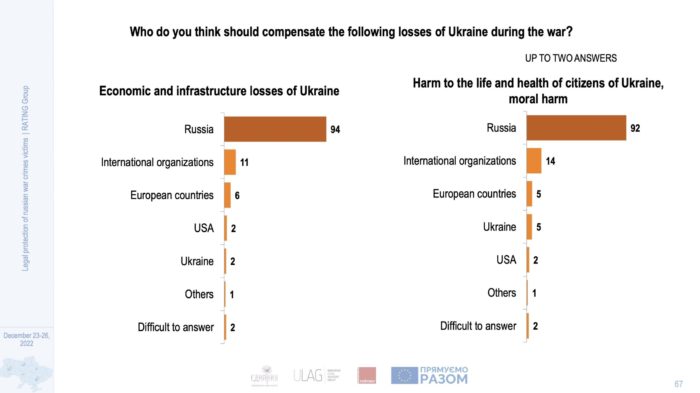Sociological Group Rating found that 16% of Ukrainians have moved since 24 February 2022, 72% have not, 10% plan to return home soon, 23% are waiting, and 11% do not plan to return. Most Ukrainians believe war crime trials should start immediately, with special courts with national and international judges being the most effective. Most respondents think international legal organizations should document Russia’s war crimes. 95% support a special judicial system, 98% believe Russian political authorities are guilty of war crimes, 96% think Russian military personnel is, and 87% believe Russian citizens are. Self-trial for Russian war crimes is justified, but restitution for losses and moral harm to Ukrainians by Russia is not guaranteed.
According to research conducted by Sociological Group Rating, the following are the internal migration indicators in Ukraine. Since 24 February 2022, 16% of Ukrainians are now internally displaced persons, 12% of those who left have since returned home. 72% did not relocate from their primary place.
Half of those who have left intend to return after the war is over. 10% plan to return home soon, 23% are still waiting, and 11% do not intend to return. Two-thirds of residents in hostilities-affected areas (South and East) are currently living outside their homes.
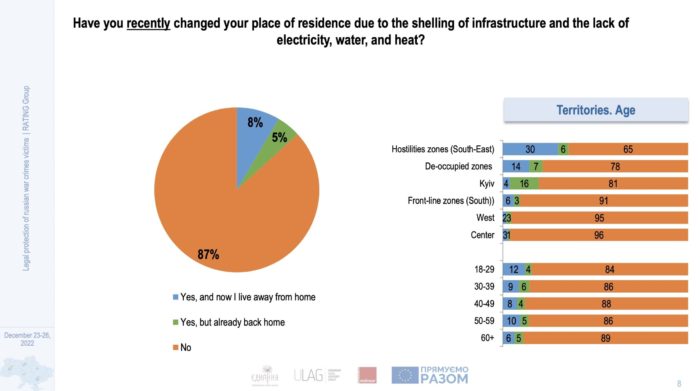
Most respondents (87%) have not moved due to infrastructure shelling. 8% of Ukrainian respondents have left and live away. And 5% have left and already returned.
Housing loss
Every tenth respondent has suffered housing damage or destruction: 2% reported that their homes were damaged and uninhabitable, 6% reported partial damage, and 2% said that their homes were destroyed but already restored. For the majority (86%), there has been no change in housing. Among the residents of the hostilities zone, 9% of hostilities zone residents reported their homes destroyed and 20% partially damaged. In de-occupied territories, 5% of respondents reported destroyed housing, 14% partially damaged, and 5% reported damaged housing that had already been repaired.
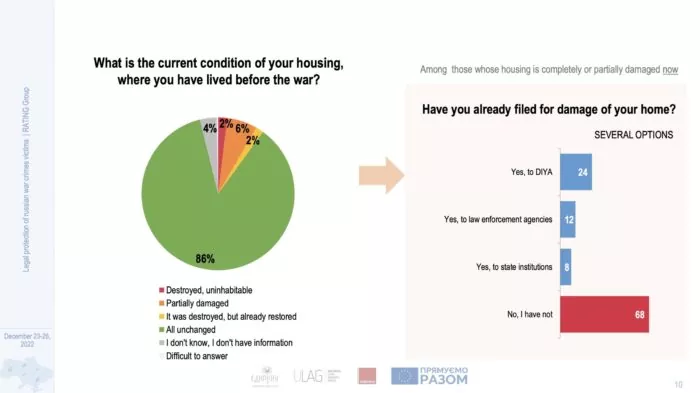
24% of respondents whose homes were destroyed or partially damaged reported damage to DIYA, 12% to law enforcement agencies, and 8% to state institutions. Almost 70% of respondents did not submit applications.
Job and income loss
Among those who held a job before the war, 40% continue to work, 17% work either remotely or partially, and 8% have found new employment. 33% are currently unemployed.
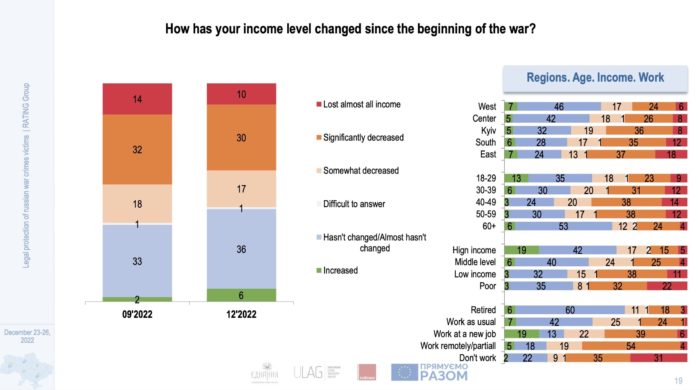
Since the beginning of the war, 6% of respondents reported an income increase; 36% noted little change, 17% reported a slight decrease, and 30% reported a significant decrease. 10% of those polled lost almost all of their income. The income situation is worse among the south and east residents, middle-aged people, the poor, and low-income. Additionally, those who have lost their jobs or work part-time all experience worse income situations.
Health and family losses
46% said that their physical health had not changed during the war. 32% said it had slightly worsened, and 21% of respondents said it had significantly deteriorated. Residents of hostilities zones, those who are older and have lower income, women, and those who have fled their homes, been injured, or lost loved ones due to the war were more likely to report deterioration.
Nearly every tenth respondent indicated that they or close relatives had been injured as a result of the war. 66% of them have documented the injury’s details.
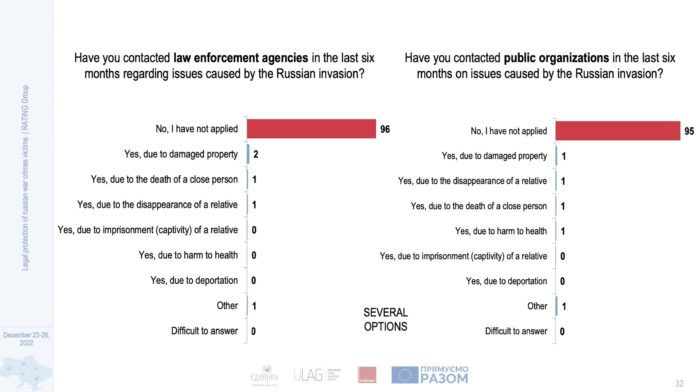
17% have lost contact with close relatives. They do not know where their relatives are now. 5% of respondents have those who died as a result of the war. 3% of responders have those who were forcibly deported to Russia or the occupied territories of eastern Ukraine and Crimea.
In the past six months, 96% of respondents have not contacted law enforcement agencies regarding Russian invasion-related issues. It is due to the absence or insignificance of direct damages/losses as the primary reason (90%).
Furthermore, over the past six months, 95% of respondents have not contacted public organizations regarding Russian invasion-related issues.
Legal action
Approximately one-third of the respondents are willing to personally pursue compensation for lost property or health in Ukrainian, international, or special courts with national and foreign judges.
According to 75% of those polled, the priority for justice regarding war crimes should be the fair punishment of war criminals. Meanwhile, 21% of responders cite compensation for victims.
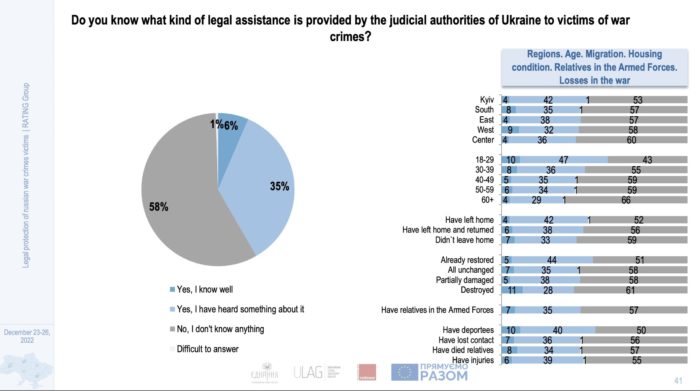
Only 6% of responders are aware that the Ukrainian justice system offers legal assistance to victims of war crimes, while 35% have heard something about it. Nearly 60% of respondents are clueless. Another 60% are interested in learning more about legal aid from justice officials, while 37% are not.
65% of respondents believe that the Ukrainian law enforcement system effectively investigates Russian war crimes, while less than 20% disagree. The leading causes of inefficiency among the respondents are corruption (59%), citizens’ mistrust of law enforcement officers (29%), their unprofessionalism (24%), and lengthy case proceedings (21%).
Evaluation of institutions
In the same manner, the effectiveness of Ukraine’s judicial system in investigating war crimes was evaluated: 60% of respondents deemed it effective. Concurrently, 20% of respondents deemed it ineffective.
The respondents cited the main reasons for the judicial system’s inefficiency, such as corruption (65%), public distrust of courts (36%), lengthy proceedings (21%), and judges’ unprofessionalism (15%).
International War Crimes Tribunal
The majority (75%) believe that war crime trials in Ukraine should begin as soon as possible. Meanwhile, 23% of respondents believe they should begin after the war is over.
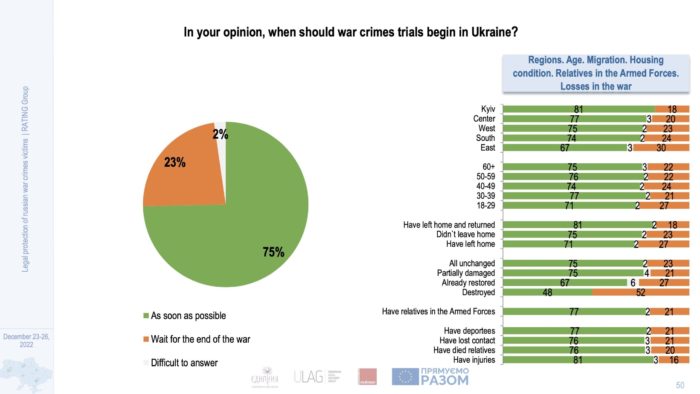
65% of respondents consider special courts with national and international judges to be the most effective trial mechanism for Russia’s war crimes. Another 22% believe international institutions will be effective in this case. Meanwhile, 7% of respondents believe Ukrainian courts will be effective.
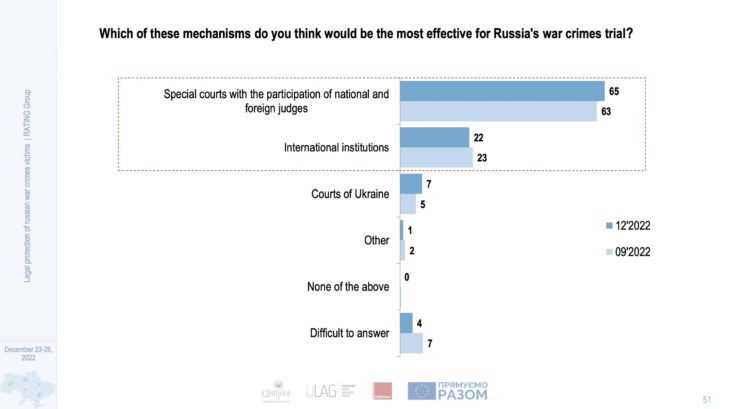
The overwhelming majority (96%) agree that international legal organizations should be involved in documenting Russia’s war crimes during the war.
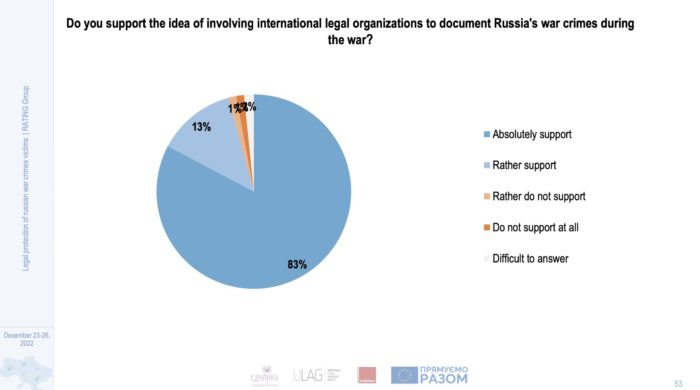
15% of respondents are aware of the initiative to establish a special international tribunal for the crime of aggression against Ukraine. Nearly 60% of respondents have heard about it. One-fourth of respondents have no knowledge about it.
At the same time, 96% of respondents believe this tribunal should look into other war crimes, namely crimes against humanity and genocide. 95% of respondents consider that both Ukrainian and foreign experts should investigate the crime of aggression committed against Ukraine.
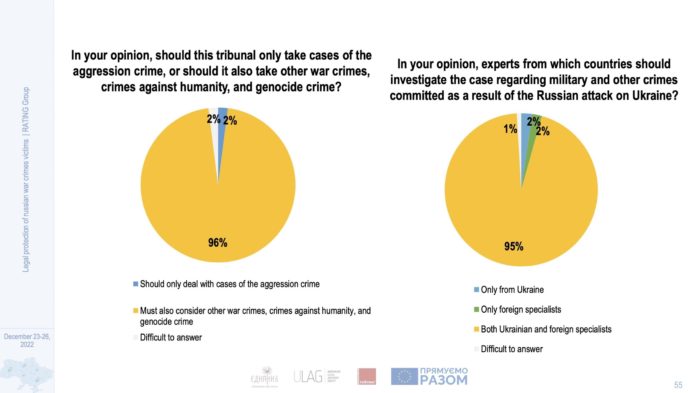
Nearly 90% of respondents support the establishment of a special judicial system similar to an anti-corruption system. It is to administer justice for crimes committed during Russia’s war against Ukraine.
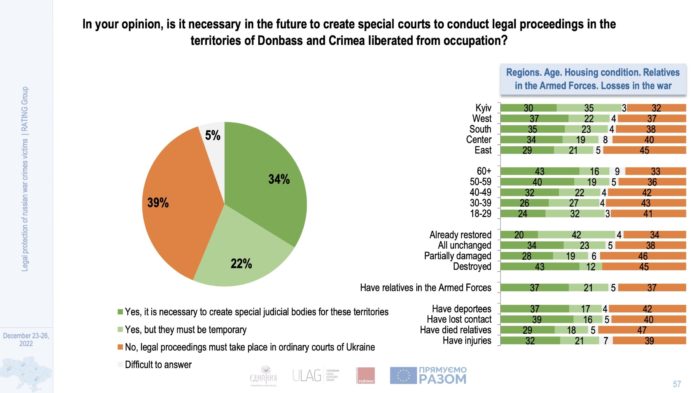
34% of respondents believe that special judicial bodies should be established to conduct judicial proceedings in the liberated territories of Donbas and Crimea. Concurrently, 22% support the temporary establishment of such special courts. Nearly 40% of respondents stand for judicial proceedings in the liberated territories in ordinary Ukrainian courts.
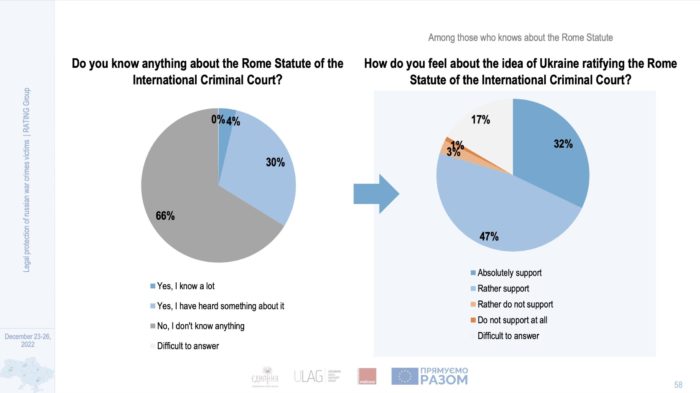
Only 4% of respondents are familiar with the International Criminal Court’s (ICC) Rome Statute. Meanwhile, 30% of respondents have heard something about it. More than 60% have no knowledge. In contrast, roughly 80% support Ukraine ratifying the ICC Rome Statute. 4% of respondents oppose it, while 17% are undecided.
War criminals
The majority of respondents (98%) believe that Russian political authorities are guilty of war crimes against Ukraine. Concurrently, 96% believe the same of Russian military personnel. 87% believe that Russian citizens are guilty, while only 10% disagree.
Concerning the issue of granting amnesty to various categories of occupied territory residents for whom facts of collaboration with the enemy have been established, a relative majority believes that amnesty is possible for teachers, doctors, social workers (68%), heads of local communal institutions (58%) and heads of local enterprises, banks, and organizations (51%).
Additionally, 38% support amnesty for local mass media journalists, while 57% oppose it. More than 20% of respondents support amnesty for members of local political parties and members of illegal armed groups, while more than 70% are against it. Less than 20% of respondents consider pardons for local government and law enforcement officials. At the same time, nearly 80% believe they are impossible.
Nearly 40% believe that self-trial for war crimes committed against Ukraine is justified, while 55% disagree.
Restitution for losses
According to the majority, Russia should compensate Ukraine for economic and infrastructure losses (94%) as well as moral harm to Ukrainian citizens’ lives and health(92%). 11% and 14% of respondents, respectively, mention compensation from international organizations, 6% and 5% from European countries, and 2% each from the US and Ukraine, 2% and 5% respectively.
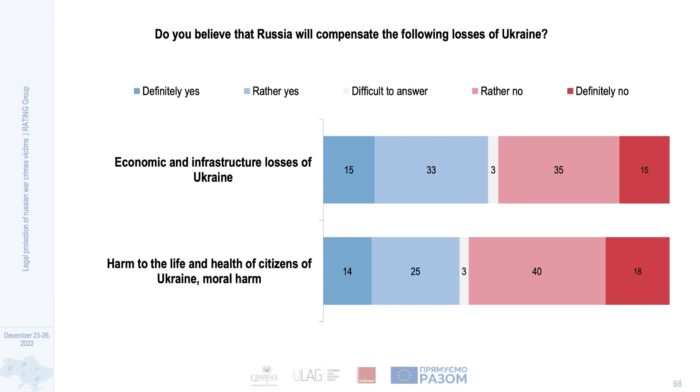
Less than half of those polled are confident that Russia will compensate for economic and infrastructure losses. Approximately the same number do not believe it. Less than 40% of respondents believe in compensation for moral harm to the life and health of Ukrainians caused by Russia, while roughly 60% do not.
On 23-26 December 2022, the sociological agency Rating polled Ukrainians aged 18 and up in all oblasts, except for the temporarily occupied territories of Crimea and Donbas and areas with no Ukrainian mobile connection at the time of the survey. The results are weighted based on the most recent data from Ukraine’s State Statistics Service. In terms of age, gender, and type of settlement, the sample is representative. The sample size was 2000 respondents. Survey method: CATI (Computer Assisted Telephone Interviewing). The study’s margin of error with a confidence interval of 0.95 does not exceed 2.2%.
Read also:
- Beginning of restitution: the Hague will keep track of Russia’s damage to Ukraine
- Hague to host center to collect data on Russian war crimes in Ukraine
- Poll shows majority of Europeans believe in Ukraine’s victory in war with Russia
- Record-high 86% of Ukrainians support country’s accession to NATO, poll shows
- Soviet nostalgia among Ukrainians plummets after Russian invasion – poll
- Ukrainians in all regions overwhelmingly reject territorial concessions to Russia – poll
- For first time since independence, majority of Ukrainians not hopeless or demoralized: poll




